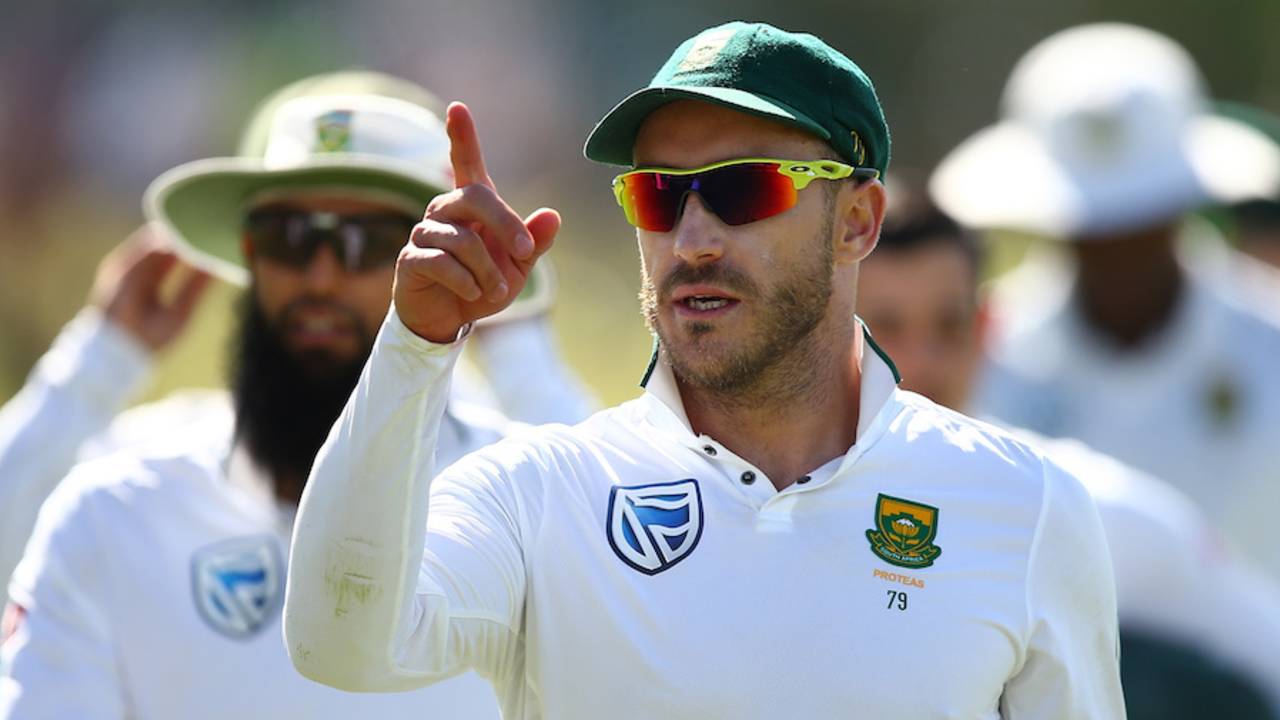South Africa's turn to play from ahead
A wet forecast for the Hobart Test will leave South Africa having to decide whether to attack the game and try to secure the series ahead of the third Test
Firdose Moonda in Hobart
Nov 11, 2016, 6:30 AM
Faf du Plessis: "Resilience generally comes from a position of defence, when you're in trouble. So we trying to make sure that we can be a little bit stronger by putting teams in that position first and not be them doing it to us" • Getty Images
It's been more than two years since South Africa have held a mid-series advantage against anyone but West Indies, so they might be forgiven for not quite knowing what to do with it. With the weather creating the possibility of a shortened Test match, should they let Australia chase the game, and the series, and come after them? Or with the unknown of a day-night Test awaiting in Adelaide, should they go all out and aim to seal the series here in Hobart?
The captain, Faf du Plessis, has hinted at the latter and said even though South Africa thrives when they up against it, he hopes they can add a more attacking dimension to their strong defensive game.
"We rely quite heavily on being a very resilient team," du Plessis said. "We're full of resilient players and personalities. If you look back on past performances here's been a lot of occasions when we are really under massive pressure and somehow a few of the guys who are really resilient fight really hard to get back in the game. That's always been a strong trait of this team.
"We're also trying to add being a little bit more positive to that. Resilience generally comes from a position of defence, when you're in trouble. So we trying to make sure that we can be a little bit stronger by putting teams in that position first and not be them doing it to us."
This South African team has little experience of asserting themselves on the opposition. Since Graeme Smith's retirement in March 2014, they only time they've done that away from home was immediately afterwards, when they toured Sri Lanka later that year. South Africa won the Galle Test convincingly to lead the two-match series 1-0. The victory proved crucial when they were in early trouble in Colombo after conceding a first-innings deficit of 139 runs, but rain and a stubborn effort from Hashim Amla and the tail helped them hold out for a draw and take the series.
Since then, South Africa have also beaten Zimbabwe in a one-off Test and West Indies at home, but lost to India and England. At home against New Zealand this year, the first of two Tests was a wash-out, and South Africa won the second. Now, after their win in Perth, they find themselves ahead mid-series for the first time since 2014. At the WACA, they put up one of their strongest fightbacks, but now du Plessis is seeking a slight switching of gears to keep the pressure on Australia.
For that to happen, South Africa require players who can adapt and du Plessis thinks they've already shown they have that because of how they respond when under the pump. "Generally guys that can adapt better in themselves are the guys who are better in those situations," he said. "You get players that play one certain way and that's the way they play.
"Resilience is being able to adapt to a position of what the team needs to do rather than what you as a player want to do. I can name a lot of our players who can do that. It's great asset to have."
Now South Africa need to show they can go the other way as effectively, like they did in Perth. "If you want to win Test matches you're going to get small opportunities in the match the whole time when it's 50-50," du Plessis said. "Either you as a team take that pressure and get through that moment and play well through that to get on top again, or you don't and then you fall behind the game.
"Luckily for us in the previous Test match we could do that a little bit more often than Australia did. They had that opportunity and they let it slip and we did really well to keep that momentum for the rest of the four days."
The lesson South Africa gained from the way they took the game forward in Perth is that they are capable of dominating again, even without some of their superstars. Hobart is about showing it was not a once-off and that they have taken the leap from transitioning to transitioned and can progress as a unit.
"It just comes with confidence. That's something you have to go through a few times to learn how to get out of it. We as a team have been through it a lot of times," du Plessis said. "Our team is very well balanced with young and older guys at the moment. But the more we play together as a test team the better we'll get, because we're still quite inexperienced as a Test team."
Firdose Moonda is ESPNcricinfo's South Africa correspondent
